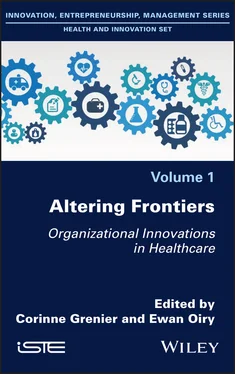Following the example of this type of university, a community of practice forms spaces conducive to building new knowledge, beyond the diversity of stakeholders, and could generate misunderstandings if it is not accompanied in this way. This misunderstanding is of three kinds (Carlile 2004): syntactic, when the misunderstanding concerns words or acronyms; semantic, when it stems from different representations or values; and pragmatic, when it calls into question the re-articulation of interests and areas of power.
These spaces are favorable to the co-construction of knowledge and discursive elements when they have certain characteristics. Thus, Delphine Wannenmacher ( Chapter 4) draws our attention to the importance of establishing interactive and reflexive spaces of dialog, in which the stakeholders will define their language and acquire new skills together. Similarly, Boiteau and Baret (2017), studying a working group on new HR practices in a public hospital, show the conditions under which this group was able to support this innovation: by being a “translation center” within which problematization and enlistment made it possible to “tackle subjects considered until then as taboos” by transforming misunderstandings or disinterest around certain questions into controversies that allow stakeholders to express themselves and develop acceptable proposals. It is here that the quality of the controversy enables innovation (Grenier & Denis 2017).
More broadly, we can understand the significance of new stakeholders in the health field, known by the generic term “intermediary organizations”, “boundary partners” (Chesbrough & Haas 2016) or “brokers” (Hargadon 1997), whose role (political, cognitive and symbolic) is to bring together professionals who are not accustomed to working together or interacting, in order to build new cognitive and discursive resources together. However, following the example of what is generally observed in third places such as FabLabs, do specific methodological resources (such as those provided by Design Thinking; Grenier et al. 2020) still need to be developed to allow stakeholders to cross the boundaries of their institutional embeddedness?
If innovation takes place “at the boundaries”, by putting stakeholders in a position to collaborate despite their different cultural or professional spheres, they must also be able to absorb this “novelty” that is made available. Corinne Grenier and
Christine Dutrieux ( Chapter 9) question the extent to which organizations can absorb, and thus bring within their boundaries, ideas, models and practices “from elsewhere”. Absorptive capacity is understood as a set of organizational routines and processes by which the organization acquires and mobilizes external knowledge to produce dynamic organizational capacity (Todorova & Durisin 2007; Imbert & Chauvet 2012). This capacity is based on four processes (or four stages):
1 1) acquisition, referring to the organization’s ability to recognize, value and acquire external knowledge and ideas;
2 2) assimilation, referring to the organization’s ability to understand, analyze and interpret this knowledge and ideas;
3 3) transformation, consisting of the organization’s ability to develop new routines to facilitate the combination of the old and the new;
4 4) exploitation, aimed at deploying this renewed stock of knowledge and ideas into new projects, activities and processes.
Entering this process means that some distance is necessary in the exploration of new ideas and knowledge from the acquired stock (to avoid absorbing only those with which individuals and organizations are already familiar). This distance is created a priori in the specific places we mentioned above (third places), which host both established operators and start-ups, professionals or entrepreneurs, and very often from various sectors. It is up to Hugo Bertillot ( Chapter 10) to offer us an original view on this ability to distance ourselves from habits. He focuses on the comparative management indicators developed since the end of the 2000s, integrated into the certification procedure for public hospitals in France and made public at the national level. They are instruments for regulation, decision support for contractualization and internal drivers for improvement. However, the power of indicators to transform hospitals is far from self-evident. Everything will depend on the ability of the stakeholders to “open the black box” of these indicators, to detect, or even build in, room for maneuver in relation to their habits of doing and thinking.
Finally, this book questions the boundary from a temporal and spatial view by questioning the diffusion of innovation. Many currents are mobilized by the literature investigating the field of health, such as: the adoption of what is new (de Vaujany 2005); a network of stakeholders to advance innovation, by operations of problematization, translation and irreversibility mechanism (Callon 1986), or more recently, by networks of practices (Agterberg et al. 2010, 2011) consisting of organizing the circulation of practices and ideas from one place to another. Healthcare innovation has a high degree of contextualization, stemming from in particular the territorialization of the stakeholders’ intervention; the question is then approached in terms not of adoption but of adaptation (Sahlin & Wedlin 2008).
This adaptation process requires specific methodologies to capture what has been experimented with in order to disseminate it, and in particular everything that is “invisible”, tacit or informal and too often cannot be reduced to “experience capitalization guides”. Thus, for Jessica Gheller, Christian Bourret and Gérard Mick ( Chapter 8), dissemination appears to be a “journey” reinforced by an exciting, meaningful communication, making it possible to identify the experiences acquired during an expedition, then continuing with the deployment of a living “memory” that will be enriched as innovations are disseminated in other places. This living memory forms a knowledge base that can be subject to questioning and reflexivity for professionals wishing to adopt experiences already developed in other spaces. It promotes learning, an essential element identified by Frédéric Gilbert ( Chapter 6) in his study on the dissemination of the family doctor group model in Quebec. In this experience, it is then, a contrario , the downside of an evaluative approach that prevents this learning and limits the journey from place to place of this original front-line organizational form.
The creation of a book is always the fruit of a long process. The present project began in 2019 when, in the vast majority of countries, the transformation of the health system was thought to be a long-term process, with uncertain results, and marked by a fiercely negotiated balance between “high” and “low”, between center and periphery, between institutional entrepreneurs and those more inclined to preserve so-called “assets”.
However, its manufacture concludes with a context that is completely new for many: the (global) health crisis of COVID-19 and the ways to combat it. Daily reports (TV, newspapers) recount the major difficulties faced by organizations and health professionals in informing, caring for and accompanying patients, users and caregivers: lack of personnel – and those who remain are exhausted – lack of masks and other protection, insufficient intensive care beds, etc. These are all the aspects of the healthcare system that are affected: hospitals, EHPAD, medical and social institutions providing support or accommodation for disabled children and adults, SAAD and SSIAD 2 , social services, “front-line” professionals, etc. This crisis will have been a powerful indicator of dysfunctions that have already been in place for a long time.
Читать дальше










